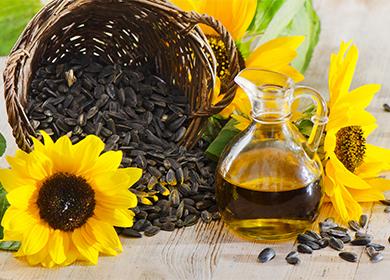The content of the article
Sunflower is an unpretentious, and therefore very common plant in the world. Central Mexico is considered its homeland, there are references to the use of culture in the economy of the Indian tribes of North and South America more than two thousand years ago.
Despite the fact that for Russia the annual sunflower is a newcomer, it is our country that produces it most of all today. Along with Argentina and Ukraine, Russia exports tons of valuable product abroad, although back in the Soviet Union, this raw material was imported from abroad for the needs of the food industry.
Product Features
Among the people, sunflower seeds are common as an independent product. In the diet, it is used separately, as a snack. It is customary to use "seeds" after eating, "husk" during rest. Popularization of the product contributes to its "lightness", the ability to take hands for a long time, as well as a valuable composition. It is widely believed that sunflower seeds are incredibly useful.
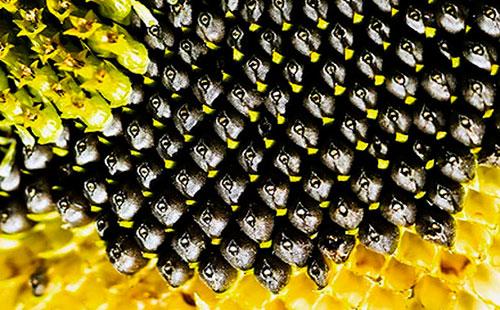
The composition of the seeds. How many nutrients in the family
This opinion is justified, since the seeds contain many valuable and necessary elements for a person. Almost eighty percent of every sunflower seed consists of fats, of which only twenty percent are saturated.
There is no cholesterol in the product at all, therefore its use does not affect the health of blood vessels and the circulatory system. But in abundance - other components, each of which plays a significant role in the metabolic processes of our body.
- Vitamin E. Contained in linolenic and oleic fatty unsaturated acids in the composition of the fruit. One hundred grams of the product accounts for more than one hundred and thirty percent of the daily norm of tocopherol, which a person must use in order to maintain the work of the heart and blood vessels, clarity of thought and beauty of the skin.
- Vitamins of group B. The product contains from thirty-five to seventy percent of the daily intake of vitamins B3, B5, B6. They are necessary for our body for the correct functioning of the nervous system, normalization of sleep. The condition of the skin also depends on the intake of these vitamins. Their lack is manifested by dandruff and rashes on the face.
- Phosphorus, selenium. Their daily rate in one hundred grams of the product exceeds one hundred percent. Trace elements provide bone strength and are one of the most important components of skin health and youth.
- Magnesium, potassium, zinc. The main components of the circulatory system are contained in up to forty percent of the daily intake. Magnesium and potassium are vital for the heart, and zinc takes care of strong immunity, the beauty of the skin and hair.
The composition of sunflower seeds is a storehouse of components for beauty and youth. One hundred grams of the product contains everything you need to maintain the tone and vitality of the skin, hair, heart and blood vessels. Such a composition determines the beneficial properties of sunflower seeds. In addition, the seeds contain plant fiber, which improves bowel function.

Harm
However, such a saturated composition also has a downside. A high concentration of fats in the product invariably affects the state of the body, and does not always change it for the better.
- Fat is most easily absorbed by the body. If our body has to work hard to process protein, that is, spend energy on digestion, then fats are absorbed almost independently. This makes them the main easy source of energy, and when there is nowhere to spend it - the basis for the formation of fat "deposits". Composed of eighty percent fat, the seeds quickly transform into adipose tissue when eaten on the couch in the evening.
- Seeds are high in calories. The calorie content of the product is extremely high. It is five hundred and eighty calories per hundred grams. For comparison, a similar “dose” of calories contains a portion of pork kebab, and in a chocolate bar the calorie level is two times lower than in a glass of “seeds”. That is why the product should be used with extreme caution, since in addition to the obvious benefits, it contributes to the formation of excess weight.
- Harmful components. In 2010, activists of the Public Control Consumer Rights Protection Society conducted a study of the composition of packaged sunflower seeds sold on the Russian market. The most popular product brands have been investigated. In each of them, an excess of the dangerous component, cadmium, was detected. This substance penetrates into products from soil and water, and enters the human body unchanged. In the tissues, cadmium accumulates and causes pathological processes. With a high level of consumption within 0.6 milligrams per day, life-threatening. In the middle of the last century, fatal cadmium poisoning was recorded in Japan. Relatively safe is considered the norm of consumption of the substance up to 0.07 milligrams per day. In the test samples of seeds, the content of the hazardous component was recorded within 0.02 milligrams per hundred grams of the product. Active and passive smoking increases the daily "dose" of cadmium. By smoking a pack of cigarettes, a person receives an additional 0.02 milligrams of the most dangerous substance.
- Danger to tooth enamel. The harm of sunflower seeds is an intense mechanical effect on white teeth, which provokes damage to the tooth enamel. Regular exposure to the husk promotes the formation of cracks and the intensive destruction of dental tissues, creates the conditions for the development of carious formations. To bite them is harmful.
It is also important to consider that the composition of the product is not stable, depending on the duration of storage, the characteristics of heat treatment. Fried sunflower seeds lose the bulk of useful components and serve only as sources of "empty" calories.
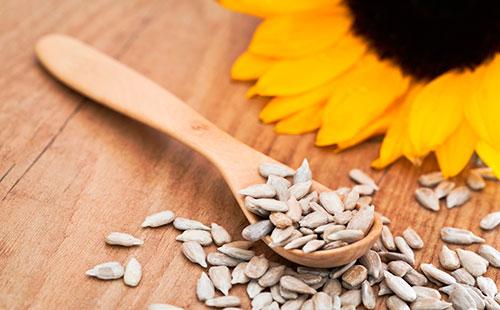
Rules for eating sunflower seeds
Consider the main misconceptions that accompany the use of sunflower seeds.
- With high cholesterol, the product is prohibited. The sunflower seed has no relation to the level of cholesterol, since this harmful component in the composition does not exist at all. You can use it even with atherosclerosis.
- With diabetes, it is impossible to husk seeds. Sunflower does not have a direct effect on blood sugar, therefore, with diabetes, their use in food is not prohibited. But it is important to take into account the high calorie content of the product, which is fraught with a set of additional weight for insulin-dependent diabetes of the second type.
- For pregnant women, the product is dangerous. Myth again. The composition of the seeds does not adversely affect the state of health of the mother and baby. The main limitation is precisely in calories. Rule: it is better often and little by little - it acts here fully.
- Breastfeeding may interfere with the baby’s digestion. There is a rule of consuming all products without exception in HB. If you ate them during pregnancy, the baby’s body is already familiar with them and can be considered relatively safe. But a nursing mother must monitor the reaction of the crumbs. If everything is in order with the tummy, there are no allergic manifestations, you can eat any product, including seeds.It is only important to observe moderation, since even from the safest components of food, but eaten in large quantities, negative reactions from the digestion of the child may occur.
- For children, the use is fraught with appendicitis. Neither for men, nor for women, nor for babies has been proven the relationship of sunflower seeds with inflammation of the cecum, and the product does not affect the liver. Appendicitis is impossible to “eat” with seeds. The main thing is not to abuse the product at night.
- When losing weight, eating seeds is prohibited. Why? Despite the fact that sunflower seeds are an extremely high-calorie product, you can use them with a diet. They compensate for the lack of fat, which is necessarily formed in a diet with an abundance of protein foods and vegetables.
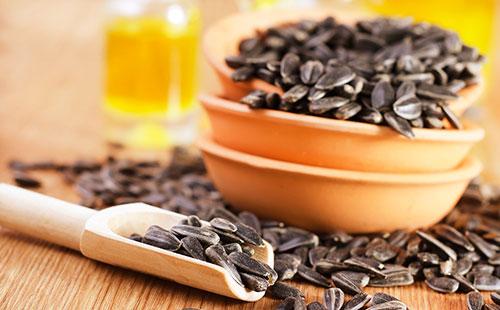
The choice
To fully benefit the sunflower seeds, adhere to the basic rules for choosing a product.
- Only in the peel. The cleaned yards are safe for tooth enamel, but they have no practical value for the body. In contact with air, the fats contained in them are rapidly oxidized and lose their beneficial properties. Only buy peeled sunflower seeds.
- New crop. Look at the packaging date of the product. Seed collection time is September-October. In the nucleoli, packaged in the fall, significantly more valuable components than those that are packaged in the spring. When storing oil, they run rancid, in addition, with an increased level of humidity, the raw material fades and becomes unpleasant.
- Not fried, not salted seeds. In fried kernels there is nothing useful other than plant fiber. It is unreasonable to use them as a source of vitamins and minerals. Salt does not affect the composition of the product, but it does not bring benefits to the body. Excessive salt in the diet causes edema, prevents weight loss. It is useful to eat in its pure form.
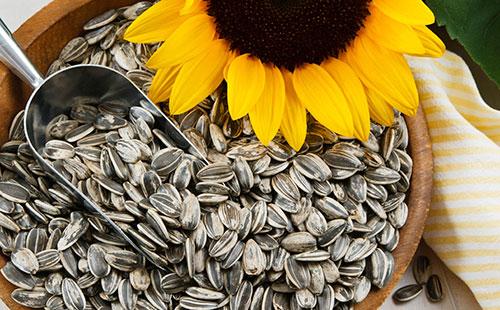
Norms and Cooking
Earlier in dietetics, the daily measure of eating sunflower seeds was determined by twenty to thirty grams per day. However, according to scientists, this measure is outdated. Specialists of the Kuban State Technological University M.V. Stepuro and V.G. Lobanov in 2008 conducted a study of raw materials on the main indicators of quality and composition.
Scientists noted that in recent years, most varieties of annual sunflower have been replaced by hybrids in the fields. The advantage of the latter is its high resistance to diseases and negative natural factors. They are also attractive for the production of vegetable oil, as they have increased fruit fraction, increased fat content. So the proportion of lipids in high-oil varieties, as hybrids are called, increased from thirty-seven to fifty-two percent.
You should also properly prepare the product.
- Rinse the seeds. Grown on the field, for some time they were stored on a current, poured into bags, transported to the point of sale. They cannot be absolutely clean. Before cooking, rinse them in running water. It is convenient to do this in a strainer or colander.
- Cook without oil. Frying seeds in vegetable oil is the same as eating butter with fat homemade sour cream. Also, do not add salt during cooking.
- Do not fry. The best way to preserve valuable substances is to slightly dry the product. It is convenient to do this in the oven or microwave. Reduce cooking time to a minimum.
Do not peel the seeds with your teeth. After all, everyone wants to have a beautiful smile. Restoring tooth enamel is impossible, sooner or later, but you will have to seek expensive dental care for dental prosthetics. Remove the husk with your hands, peeling the seeds with your thumb and forefinger.
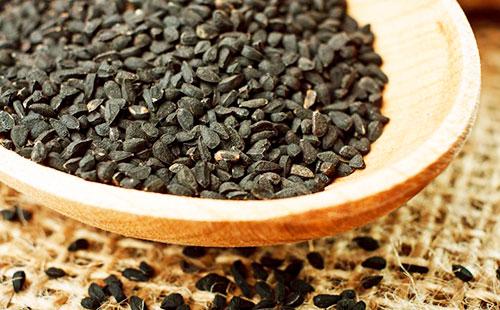
Storage
Sunflower raw materials have a critically low resistance to external conditions. At elevated temperatures, it can deteriorate in just a few hours. The normal storage temperature for it is no more than ten degrees Celsius with a seed moisture level of up to twenty percent.
Therefore, it is necessary to store the seeds in the refrigerator. They tolerate temperatures well from zero to eight degrees. Such conditions block oxidative processes, while maintaining a high level of quality of oilseeds.
At home, storing seeds is not rational. It is more convenient to buy seeds in small batches, up to half a kilogram, and then dry them. The finished product can be stored for several weeks.
Sunflower seeds are a popular and useful product. They are extremely rich in fatty acids, essential for our skin, hair, and cardiovascular system. But so that the beneficial properties of sunflower seeds do not “crash” about the harm of calorie content, they should be consumed sparingly. A safe daily rate of the product is up to fifteen to twenty grams.
